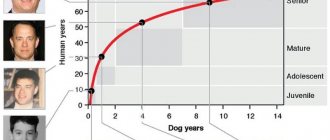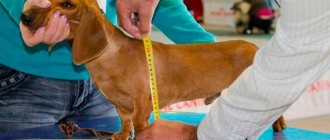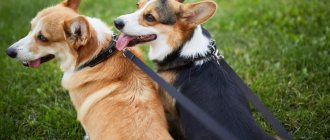The four-legged animals sleep at night, but sometimes wake up and like to take a nap after eating and walking. And besides, if a dog lies with his eyes closed, this does not mean that he is sleeping. Are you worried about your pet's condition? Does he look tired and sleep-deprived? Or are you just wondering how much dogs sleep per day? In any case, let's look at the data that is available to us.
Stages of sleep in dogs
How long should a dog sleep: stages of sleep in dogs
It has been established that the structure of dog sleep is no different from human sleep and includes several stages:
- Nap . The primary stage of sleep, contributing to the partial restoration of vital energy. A dozing dog is in a relaxed state, but can control what is happening.
- Superficial (shallow) sleep . The second stage, during which tissue repair processes are activated in the animal’s body. The dog is completely relaxed, but is able to detect loud sounds.
- Deep dream. Replaces the phase of superficial sleep and is characterized by the absence of dreams. In the deep stage, the dog rests fully, snoring or snoring.
- Quick sleep. The shortest phase, accompanied by increased brain activity and processing of received impressions. A dog that is sleeping begins to twitch its paws, move its eyes closed, change body position, wag its tail, whine or bark.
The REM sleep phase is followed by complete awakening or a transition to the deep stage.
Factors influencing duration
Pet illness and, as a result, lethargy and fatigue increase the time.
Another factor influencing the duration is the amount of physical activity the dog gets. Animals that are walked for long periods of time and undergo intense training sleep longer.
Noise, stressful situations, anxiety and the presence of a threat make a dog's sleep intermittent and short.
As it turns out, the sleep of dogs and people is identical in structure, only the periods last differently
When and how do dogs sleep?
Dogs living in an apartment are not concerned about searching for food and do not have to constantly remain on guard in case of danger. Therefore, they can relax and doze most of the day and sleep soundly at night. Guard dogs tend to be light sleepers. If one dog barks on the street, the rest begin to bark after him.
In winter, dogs sleep on a bed. In hot weather, dogs move to the floor or to secluded, cool places.
Dogs sleep in different positions - curled up, lying on their back, side or stomach:
- On the back. In this position, the animal's most vulnerable places are exposed - the belly and throat. A dog sleeps on its back only if it is very tired, completely relaxed and in a comfortable environment.
- On the stomach. This position is typical for puppies who are ready to quickly wake up and start playing, and for watchdogs guarding the territory. A dog that sleeps on its stomach hears everything and can jump up at any moment.
- On the side. This is how dogs usually sleep in the heat. Most often, animals stretch out on the floor, covering their vulnerable spots, and fall into deep sleep.
- Curled up. Domestic dogs sleep curled up in a ball when it's cold. Stray dogs must remain constantly on guard and the curl up position allows the animals to cover weak points and quickly jump up in case of danger.
Changes in puppy behavior from 1 to 8 weeks
The first two weeks of newborn puppies' lives are spent sleeping and eating. After 14 days, physical changes open up a whole new world. They begin to see, hear and walk.
By day 21, they begin to explore the world and learn what dogs are like. This is also when the socialization process begins. She learns to interact with other dogs by interacting with her mother and littermates. Human socialization is important at this time as well.
Around seven to eight weeks of age, the first "fear period" will begin. This is the time when most puppies are afraid of new things. Anything you can introduce to her before then will help ease the period of fear.
Dependence of sleep on age - table
Adult dogs sleep on average 12-16 hours a day. Puppies and older dogs spend more time relaxing.
| Dog age | Sleep Features |
| 1-4 months | Puppies only wake up to eat and sleep 20 hours a day. Well-fed babies do not react to light, noise and other external stimuli. |
| 4-6 months | At this age, puppies enter adolescence and become more active. Sleep duration is reduced to 16-18 hours. Sleeping dogs react to stimuli and may awaken during the night. |
| 6-18 months | This period marks the peak of dog activity. Animals move a lot, play and explore the world around them. Dogs quickly regain strength and sleep 12-14 hours a day. |
| 2-10 years | The body activates aging processes and slows down metabolism. Older dogs lack energy and sleep 20 hours a day. The sleep of older dogs is often interrupted by noises, smells, sounds and other external stimuli. |
What to feed a puppy from 1 to 8 weeks
During the first three weeks of life, puppies receive the necessary nutrition from their mother's milk. If your puppy is orphaned or needs extra nutrition, puppy formula can provide the necessary nutrients.
Once the baby teeth have erupted, at about three weeks of age, puppies may be ready to be weaned. Mom can naturally begin this process when she feels the puppy's teeth nipping at her nipples.
A good way to transition puppies onto dog food is to bring canned puppy food or softened puppy food (use warm formula or water to soften the food).
Be sure to choose a dog food designed for growth. You can encourage them to eat it by offering a finger stick taste.
As puppies become accustomed to puppy food, they will gradually nurse less and less. Most puppies are fully weaned between six and seven weeks of age.
Dog's daily routine
Animals, like people, develop the habit of a certain cyclicity. A dog's ability to adapt to a specific routine depends on the overall activity and flexibility of the nervous system. When kept in apartments, dogs easily adapt to their owner’s schedule.
An approximate daily routine for domestic dogs looks like this:
- Get up in the morning 5-10 minutes before the alarm, go for a walk, eat.
- Deep sleep or napping alone while the owner is working. The dog periodically gets up, drinks water and listens to sounds on the staircase. But most of the time the dog sleeps soundly or dozes.
- Meeting the owner from work, a long, exhausting walk and dinner.
- Long night sleep.
On weekends, your pet's routine is more varied. The dog is taken out of town so that he has the opportunity to run around without a leash and explore unfamiliar places. An abundance of movement and new experiences help improve the animal’s condition and normalize sleep.
Some dogs have a flexible nervous system and do not suffer from regular disruptions to their established routine. Hunting, guard or hyperactive dogs have a hard time with frequent disruptions to their usual routine. Such animals require special handling and may become stressed if the owner goes on a business trip or is delayed at work.
We recommend reading:
- Why does my dog shed a lot?
- Why does a dog eat cat excrement (poop)?
- How to properly clean a dog's ears at home?
Possible violations
Many factors influence the duration and quality of sleep. First of all, these are hormones. If a dog suddenly begins to sleep poorly, twitch, or behave restlessly at night, and this condition continues for several days, this is a reason to think about violations.
Important! If poor sleep is accompanied by excessively rapid breathing or excessive sweating, then the owner may suspect a disorder in the metabolism of thyroid hormones. You need to take your pet to the vet.
Howling at night, waking up abruptly, or even sleepwalking may indicate the presence of neurological diseases. Especially if before this the dog had some kind of injury or blow to the head (accident, accident or cruel former owners).
Deep sleep, longer than usual for no apparent reason, indicates depression. This is possible if the dog misses its owner when he is away from her. Or when the puppies are taken away from the mother, then she will also be depressed for some time and want to sleep more.
Dogs sleep longer when depressed
It is impossible to give an ideal answer to the question of how much puppies sleep at 2 months, at one year, two months, etc. Sometimes even genetics influences this factor. Having slept 2-3 hours less than normal, the dog still feels good, if this is in its genes.
Sleep is an individual state for a pet. It is influenced by a comfortable bed, breed, genetics, the region where the animal lives, and even the regime of the owners themselves. But there are a lot of reasons for sleep disturbances.
You can’t panic in advance and make diagnoses yourself. Sometimes the reasons can be trivial, and sometimes serious. Only a veterinarian can confirm this, as well as prescribe treatment. Therefore, if you notice deviations in this process, you should not waste time. Dog owners should contact their veterinarian first.
Should you allow your pet to sleep with its owner?
If a dog really suffers separation from its owner during the day, gets bored or is cold, perhaps you shouldn’t deny your four-legged friend such pleasure. The dog will receive the missing human warmth at night, which neutralizes the stressful state.
If the dog is aggressive and exhibits pronounced dominant qualities, the cooperative dog may manifest itself as a desire to lead and a misunderstanding of “who’s boss.” In this case, such behavior must be stopped and the dog trained in its place. This measure is necessary for obedience.
Owners sometimes feel like their pets sleep soundly day and night.
The disadvantage of sharing a bed with a dog is unhygienic. Animals are carriers of helminths, ticks, fleas and other parasites that can be transmitted to humans through close contact. Even if a pet does not walk outside, it can become infected through a person’s outdoor shoes.
The article talked about dog sleep. The phases and factors influencing its duration are described. Examples of positions in which pets sleep are given. The topic of dogs sleeping together with their owners is revealed: why animals like to sleep with people, and whether this should be allowed.
We adopted a puppy from the street: what to do next?
If you have a puppy, buy from a pet store:
- Collar;
- leash or harness;
- bowls for food and water (drinking bowl);
- hair care products - shampoos, brushes taking into account the length of the hair;
- bed;
- diapers - small puppies are not accustomed to the street and will crap in the house until they are 6-8 months old;
- dog cleaning products;
- toys - a small pet is very active, without toys he can chew through all things;
- treats for training.
Buy a carrying bag. You can use it to transport your pet to the veterinarian. If the dog is small, the bag will come in handy when he grows up.











